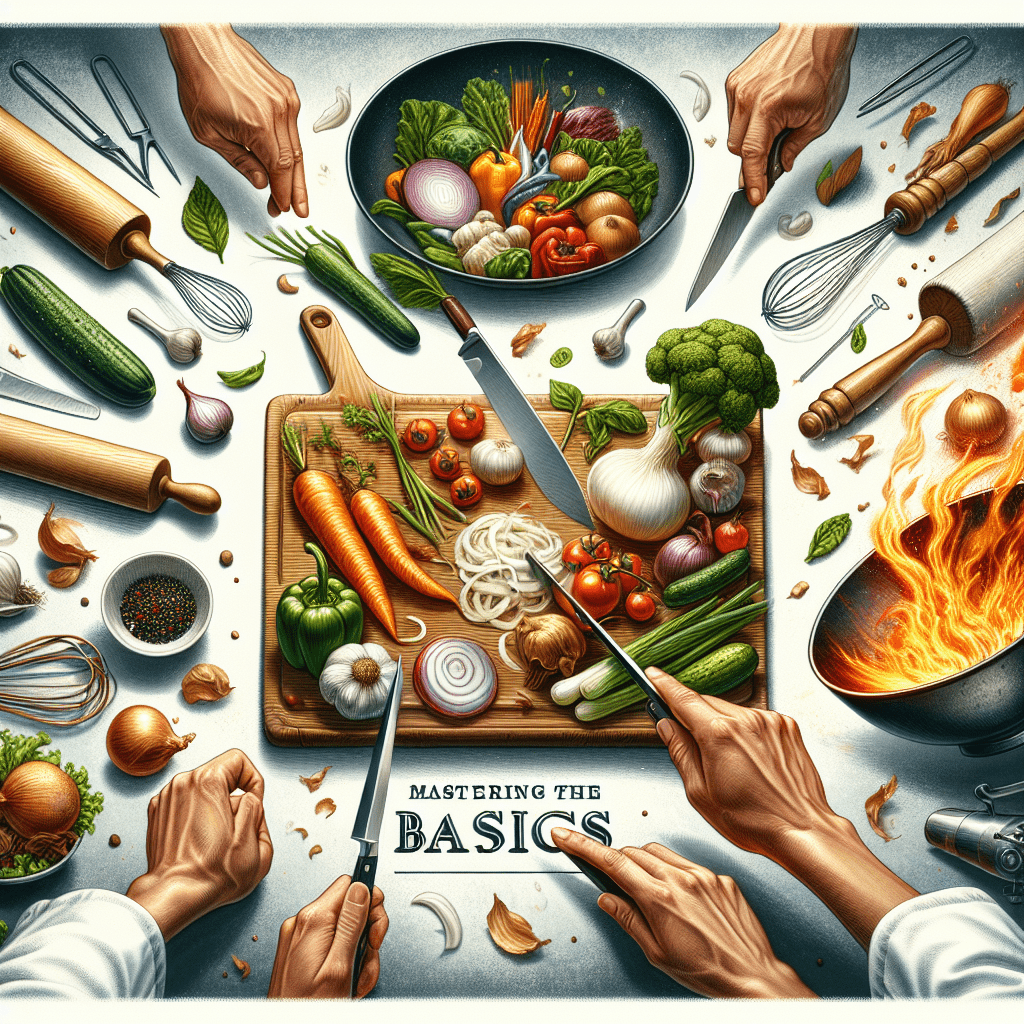[ad_1]
**Mastering the Basics: Essential Techniques in Culinary Arts**
Culinary arts encompass a broad spectrum of skills and knowledge, aiming to craft delicious, aesthetically pleasing dishes. Whether you’re an aspiring chef or a home cook looking to elevate your cooking game, understanding and mastering basic culinary techniques is paramount. These foundational skills not only improve the quality and flavor of your dishes but also increase efficiency and confidence in the kitchen.
### Knife Skills
Knife skills are arguably the cornerstone of all cooking skills. Properly chopping, dicing, and mincing can significantly affect the texture and cooking time of your ingredients. Start with mastering how to hold a knife correctly – this will improve your precision and safety. Practice with different cuts: the julienne (thin strips), dice (cubed), and chiffonade (thin ribbons), using a variety of vegetables. Consistency in size and shape ensures even cooking and presentation.
### Understanding Heat
Heat management is crucial in cooking. Learning how to control heat means understanding the differences between simmering, boiling, sautéing, searing, and roasting, among others. Each technique brings out different flavors and textures in food. For instance, searing meat on high heat locks in juices, while slow cooking at a lower temperature can make the toughest cuts tender and flavorful.
### Sauce Making
The art of sauce making is a key skill in culinary arts, revolutionizing dishes with depth and complexity. Master the five mother sauces of French cuisine: béchamel, velouté, espagnole, tomato, and hollandaise. From these, you can create countless variations, or “daughter sauces,” to accompany any dish. Understanding emulsions, reductions, and seasoning will allow you to customize and craft sauces from nearly any base ingredients.
### Baking Basics
Baking is as much science as it is art, requiring precision in both measurement and technique. Understanding the functions of ingredients like flour, sugar, eggs, and fats can help you predict and influence the texture and flavor of your baked goods. Techniques such as creaming butter and sugar, kneading dough, and folding ingredients can make or break a recipe. Start with simple recipes to fine-tune these skills.
### Butchery and Fish Preparation
Knowing how to break down meats and fish not only saves money but also opens up a wider range of culinary possibilities. Learn the basic cuts of beef, pork, and poultry, and understand the best cooking methods for each part. With fish, practice filleting and skinning, as well as recognizing freshness and quality. This knowledge allows for more sustainable cooking by utilizing entire cuts of meat and fish.
### Plating and Presentation
Finally, the art of plating and presentation is essential for making your dishes visually appealing. The arrangement of food on the plate, the balance of colors and textures, and garnishing can enhance the overall dining experience. Experiment with different plating techniques and find a style that complements your culinary creations.
### FAQs
**Q: How long does it take to master basic culinary techniques?**
A: The time it takes to master these techniques varies widely among individuals, depending on their dedication, practice, and prior experience. Consistent practice over several months can lead to a solid understanding and proficiency in basic culinary skills.
**Q: Can I learn culinary arts on my own, or do I need to attend a cooking school?**
A: Many skilled home cooks have learned through self-study, practice, and experimentation. Online resources, cookbooks, and cooking shows can provide a wealth of information. However, attending a cooking school can offer structured learning, professional guidance, and hands-on experience that may be harder to achieve independently.
**Q: Is it important to invest in high-quality kitchen tools and equipment?**
A: While high-quality tools can make certain tasks easier and more enjoyable, they are not strictly necessary to master basic culinary techniques. Focus on acquiring a few essential, good-quality items, such as a chef’s knife, a cutting board, and a sturdy pan. As your skills improve, you can gradually invest in additional tools.
**Q: How can I practice these skills if I’m on a tight budget?**
A: Culinary skills can be practiced with the most basic ingredients and tools. Start by mastering techniques with affordable ingredients, such as vegetables for knife skills or inexpensive cuts of meat for butchery. Many fundamental principles, such as heat management and sauce making, can be practiced with minimal cost.
**Q: Are culinary techniques universal, or do they vary by cuisine?**
A: While certain culinary techniques are universal, such as knife skills and basic heat application, many techniques and principles can vary significantly from one cuisine to another. Exploring and learning about different cuisines can expand your culinary repertoire and introduce you to a variety of techniques and ingredients.
### Conclusion
Mastering the basics of culinary arts is a journey that can transform the way you cook and experience food. By focusing on essential techniques such as knife skills, understanding heat, sauce making, baking basics, butchery, and presentation, you’ll lay a solid foundation for culinary excellence. Practice, patience, and a passion for cooking are key to developing your skills and becoming proficient in the culinary arts.
[ad_2]

Leave a Reply